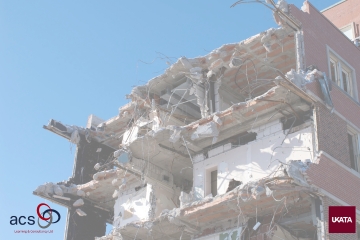LICENSABLE WORK WITH ASBESTOS
Operatives | Supervisors | Managers/Directors | Scaffolders | License Holders
Introduction
This syllabus sets out the guidance issued by the UK Asbestos Training Association (UKATA) for the provision of licensed asbestos training as contained within the Control of Asbestos Regulations 2012 (CAR). The document provides the syllabus for the training along with guidance on the minimum content of all courses. Trainers can offer bespoke or tailored training for the remainder of any training session but the core content MUST be adhered to.
The Control of Asbestos Regulations 2012, Regulation 10 requires every employer to ensure that adequate information, instruction and training is given to their employees who are or who are liable to be exposed to asbestos, or who supervise such employees.
Control of Asbestos Regulations 2012, ACoP L143 (Second Edition) Regulation 10, Paragraph 246 - 253 specifies the training that is required for those undertaking licensable work with asbestos containing materials as defined by CAR 2012. This is also further stated in the Health and Safety Guidance Document– Asbestos – The Licensed Contractors Guide (HSG247), Appendix 4.1.
Occupational Relevance
Any persons carrying out licensable work with asbestos containing materials, as laid down in CAR 2012. This would normally include, but is not limited to, licensed asbestos removal contractors and ancillary trades such as scaffolders who undertake licensed asbestos ancillary work, companies maintaining negative pressure units and class “H” vacuums and those required to enter into enclosures to carry out other ancillary work.
Duration
A day’s training means at least 6 learning hours, not including breaks. Licensable training is separated into the following categories and the expected duration of training is outlined below:
- New Operative: 3 days or a minimum of 18 learning hours (inclusive of 1 day or a minimum of 6 learning hours of practical sessions.
- New Supervisor: 3 days or a minimum of 18 learning hours (inclusive of 1 day or a minimum of 6 learning hours of practical sessions).
- New Managers/Director: 2 days or a minimum of 12 learning hours.
- Scaffolders: ½ day or a minimum of 3 learning hours.
- Scaffolding Supervisors: ½ day or a minimum of 3 learning hours (in additional to the ½ day or minimum of 3 learning hours Scaffolder training).
- Managers/Directors of Scaffolding Companies: 1 day or a minimum of 6 learning hours.
- Supervisory Licence Holders: 2-4 days or a minimum of 12-24 learning hours (inclusive of 1 day or a minimum of 6 learning hours of practical sessions). People may be exempt from certain modules if they hold relevant qualifications as determined by the course tutor. A TNA should identify the outstanding training that should be covered in addition to previous training undertaken.
- Refresher training for all roles: 1 day or a minimum of 6 learning hours (with the exception of Scaffolders and Scaffolding Supervisors where the expected duration of this training will be ½ day or a minimum of 3 learning hours).





